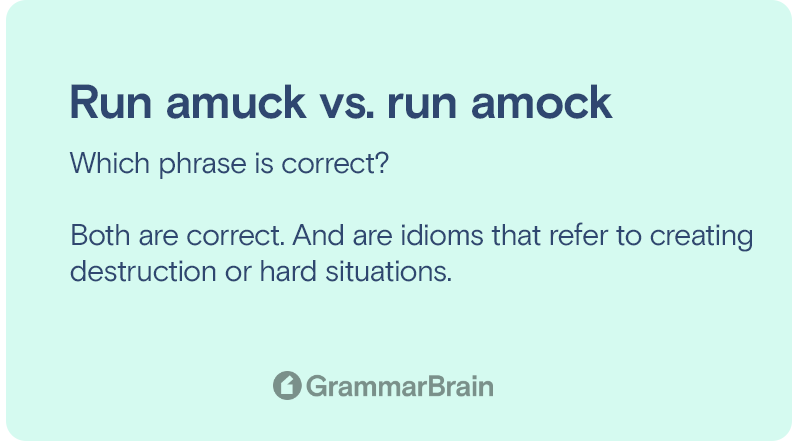Is it run amok or run amuck? Amok is a Malay word used to describe chaos or chaotic situation. The adverbs amok and amuck are two synonyms for it. The idiom “run amok” refers to being out of control and is where they are most frequently used.

What Is The Meaning of the word “Amok?”
An adverb used to describe something out of control or chaotic is amok. Run amok or run amuck, both can be a verb phrase or an adverb phrase.
Amok is a mental state most often defined in psychiatry as an ethnic-specific syndrome characteristic of the inhabitants of Malaysia, the Philippines, and nearby regions, characterized by intense motor excitement, usually running and aggressive actions, and gratuitous attacks on people.
A characteristic feature of amok is that this condition is not controlled and is aimed at destroying objects and bringing physical injury, often fatal to people around. There are no apparent reasons for amok; some researchers believe this condition is associated with a partner’s betrayal.
The person who has been cheated on feels his inadequacy and is afraid of ridicule from others. Gradually, these emotions are replaced by hatred for others, and a compensatory mechanism of aggressive behavior comes into play.

Difference Between Run Amok and Run Amuck
Both “run amuck” and “run amok” are correct spelling. Run amuck used to be the more popular spelling.
Before the middle of the 20th century, the Malaysian loanword’s ancient alternate spelling, amuck, was widely used but has since lost use.
Although certain people still favor the latter spelling, edited literature in this century prefers amok.
How To Use The Word “Amuk”
Although some people continue to use the term “amuck,” the most common spelling is “amok.” The latter must be used in all circumstances.
See below for examples:
A crowd of demonstrators was running amuck in the streets of the old town when the police arrived.
The audience during the concert ran amuck since there were no clear instructions.
The customers ran amok when the restaurant caught fire and blocked the exit.
At the riot, protestors ran amuck and flung rocks, bottles, and sticks.
Since the teacher wasn’t there, the kids were running amuck in the class.
The pupils are running amuck at the club having a class party.
When they heard an explosion nearby, the scared mob ran amuck all over the place.
Amok Synonyms
The other words that can be used instead of amok are:
- Insane
- Out of control
- Wild
- Berserk
- Demoniac etc.
FAQs
What does the word “Amok” mean?
Where did the word “Amok” originate?
The word amok came from Southeast Asia. For some reason, such states were attributed mainly to Malays, Indonesians, and residents of the Philippines. However, they could also manifest themselves in people who live in other regions of the planet.
Is Amuck a real word?
Yes, Amok or Amuck is a real word. It originated from the Malaysian word Amok, which expresses a mental disorder in content, a person’s delusional conviction that a certain person or group of persons is pursuing him: spying, torturing, mocking, plots to harm, steal, kill, etc.
Is “run amok” an idiom?
Yes, run amok is an idiom. To act erratically in a wild or hazardous manner is called run amok or run amuck.
Which one is correct, run amok or run amuck?
Both run amok and run amuck are correct spelling as they both refer to outrageous and out-of-control behavior. But the more typical spelling is “run amok. Nowadays, many English speakers and writers use run amok than run amuck.
Inside this article
Fact checked:
Content is rigorously reviewed by a team of qualified and experienced fact checkers. Fact checkers review articles for factual accuracy, relevance, and timeliness. Learn more.
Core lessons
Glossary
- Abstract Noun
- Accusative Case
- Anecdote
- Antonym
- Active Sentence
- Adverb
- Adjective
- Allegory
- Alliteration
- Adjective Clause
- Adjective Phrase
- Ampersand
- Anastrophe
- Adverbial Clause
- Appositive Phrase
- Clause
- Compound Adjective
- Complex Sentence
- Compound Words
- Compound Predicate
- Common Noun
- Comparative Adjective
- Comparative and Superlative
- Compound Noun
- Compound Subject
- Compound Sentence
- Copular Verb
- Collective Noun
- Colloquialism
- Conciseness
- Consonance
- Conditional
- Concrete Noun
- Conjunction
- Conjugation
- Conditional Sentence
- Comma Splice
- Correlative Conjunction
- Coordinating Conjunction
- Coordinate Adjective
- Cumulative Adjective
- Dative Case
- Determiner
- Declarative Sentence
- Declarative Statement
- Direct Object Pronoun
- Direct Object
- Diction
- Diphthong
- Dangling Modifier
- Demonstrative Pronoun
- Demonstrative Adjective
- Direct Characterization
- Definite Article
- Doublespeak
- False Dilemma Fallacy
- Future Perfect Progressive
- Future Simple
- Future Perfect Continuous
- Future Perfect
- First Conditional
- Irregular Adjective
- Irregular Verb
- Imperative Sentence
- Indefinite Article
- Intransitive Verb
- Introductory Phrase
- Indefinite Pronoun
- Indirect Characterization
- Interrogative Sentence
- Intensive Pronoun
- Inanimate Object
- Indefinite Tense
- Infinitive Phrase
- Interjection
- Intensifier
- Infinitive
- Indicative Mood
- Participle
- Parallelism
- Prepositional Phrase
- Past Simple Tense
- Past Continuous Tense
- Past Perfect Tense
- Past Progressive Tense
- Present Simple Tense
- Present Perfect Tense
- Personal Pronoun
- Personification
- Persuasive Writing
- Parallel Structure
- Phrasal Verb
- Predicate Adjective
- Predicate Nominative
- Phonetic Language
- Plural Noun
- Punctuation
- Punctuation Marks
- Preposition
- Preposition of Place
- Parts of Speech
- Possessive Adjective
- Possessive Determiner
- Possessive Case
- Possessive Noun
- Proper Adjective
- Proper Noun
- Present Participle
- Prefix
- Predicate



